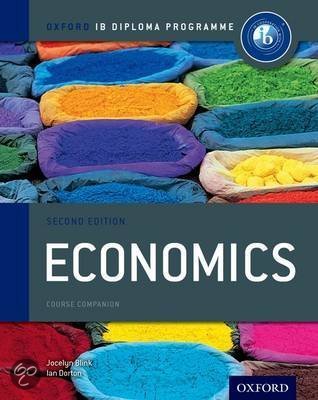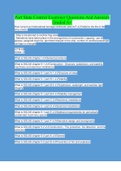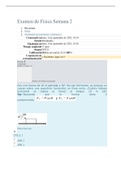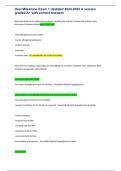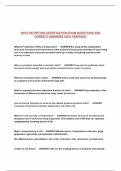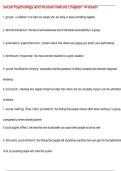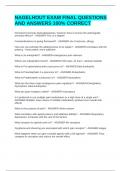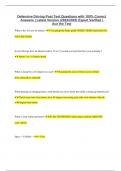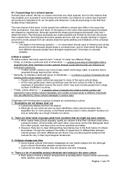,20: INTERNATIONAL TRADE: buying and selling of goods and services across country borders
- Exports: countries selling g & s produced domestically to buyers abroad
- Imports: countries buying g & s from other countries for domestic use
Specialization: occurs when an individual firm, country concentrates production on one or a few g & s
- Foreign exchange: making payments to other countries for the g & s imported and making other payments abroad
- Factor endowments: different countries taking advantages of differences in quantity and quality of factors of production and the
level of technology
Benefits of trade include:
Increased satisfaction Greater variety and quality of goods: enables a better match between the needs of consumers and the
products that are able to satisfy them, allowing greater satisfaction.
Lower prices: consumers can purchase g & s with less burden with a global division of labour taken place by
multiplied efficiencies
Economies of scale; Different countries have different resources that enable them to produce certain products at lower costs
differences in factor (ex. Scotch whiskey, Belgium chocolate)
endowments Specialisation: allows countries to devote more resources into one area = acquisition of needed resources
Political benefits Because trade requires the consent of both countries, it make them interdependent, reducing the
possibility of hostilities and violence. It also increases cultural diversity and understanding.
Greater efficiency Increased competition leading to productive efficiency: motivates firms to work more efficiently less at
lower costs and ultimately prices + technology
Efficient allocation of resources: free trade (trade of g & s between countries with no barriers put in place
by the government on imports and exports)
Source foreign exchange Countries gain foreign currencies that can later be used for further trade
Increase in domestic Countries are able to increase their output without wasting resources and with the lowest cost
production/consumption Because of such increases in efficiency and output, trade results with an overall economic growth.
Absolute and Comparative Advantage
Absolute advantage: some countries are more efficient at some forms of production than other countries
- Gives a reason to why countries should specialize and trade; activity of a lower opportunity cost
Comparative advantage: countries should specialize in the production of whatever has the lowest opportunity cost (good whose
production has the most value)
- opportunity cost X = output Y / output X
Sources of comparative advantage
1) Relative abundance of resource = efficient and low opportunity cost
2) Level of technology
3) Value of good produced from resource to the world market
- Ex. country that possesses most of farmable land likely to have comparative
advantage in agriculture
Limitations:
Perils of Extreme Specialization
- If country devotes its entire resources to production, especially if it is a commodity,
the country’s entire income is bound to price of commodity = great risk to
population’s well being and place country on potential high volatility
- Poor agricultural countries often left with producing commodities of relatively low market value → difficult/impossible for
structural economic change necessary for economic development
1
, Unrealistic Assumptions
- Transport cost, assumed to be irrelevant in theory cannot be ignored in practice as they raise costs enough to eliminate
comparative advantage
- Goods are actually differentiated rather than being identical
- Perfect information about availability and prices of all available goods is impossible given nature of global markets
- Relatively constant costs (reflected in PPC) masks potential comparative advantage for industries that appear
uncompetitive/overestimate advantage
- Two-country model does not exist, as multiple countries are involved in same goods and services
- Full employment, necessary in the condition, rarely occurs in practice
- Most countries do not fully participate in free trade, also practice protectionism with tariffs, quotas
World Trade Organization (WTO); has 148 members
Aims:
1) Trade without discrimination
2) Freer trade through negotiation
3) Predictability through binding (commitment among members to keep tariffs at or below certain rates) and transparency
4) Promoting fair competition (ex. Rules against dumping, intellectual property theft)
5) Encouraging development; ⅔ are developing countries
Functions Rules
- Provide forum for trade negotiation - Certain standards met for membership
- Executive WTO agreements - Gives equal access to all other members’ markets
- Evaluate and rule on trade complaints by member - All members are treated the same (but LDC given
countries longer timeframes to comply with rules)
- Provide technical assistance to developing countries - Total consensus must be achieved for rule to be
on trade issues instated
- Track changes in member trade policies - Holds ‘rounds of talks’ (ex. Doha Round)
For Against
- Reduces conflicts between countries = promotes peace - Despite attempts to equalize, negotiations favor rich;
- Encourages compromise most gains are from rich and poor do not have a voice as
- System is based on rules than power; condemns rich and they cannot afford to be officially represented
protects the poor - Increases the gap between rich and poor
- Free trade - Agricultural subsidies in rich have not been reduced
- Provides greater consumer choice and variety - Protection of intellectual property rights keeps
- Boosts incomes; closely related to employment and innovation from spreading quickly
economic growth - Reduction of tariffs, rich countries resort to other
- Encourages efficiency and simplicity bureaucratic barriers
- Shield countries from narrow interests - Agreements ignore cases of worker exploitation, rights,
- Creates good incentive for government safety
2

